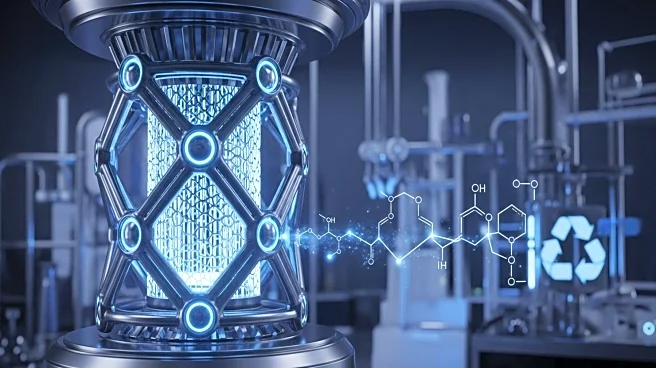What's Happening?
Northwestern University chemists have introduced a new plastic upcycling process that could significantly simplify the recycling of mixed plastic waste. The process utilizes a nickel-based catalyst to selectively break down polyolefin plastics, which include polyethylenes and polypropylenes, commonly found in single-use items. This catalyst transforms low-value solid plastics into liquid oils and waxes, which can be upcycled into higher-value products such as lubricants, fuels, and candles. The catalyst is notable for its ability to break down plastics contaminated with polyvinyl chloride (PVC), a polymer that typically renders plastics unrecyclable. The study detailing this process was published in the journal Nature Chemistry.
Why It's Important?
This development is significant as it addresses one of the major challenges in plastic recycling: the need for meticulous sorting of plastic waste by type. The new catalyst could eliminate this labor-intensive step, making recycling more efficient and economically viable. Given that polyolefins account for a substantial portion of global plastic consumption, improving recycling rates for these materials could reduce environmental pollution and reliance on landfills. The ability to recycle plastics contaminated with PVC further enhances the potential impact, as it could transform currently unrecyclable waste into valuable products.
What's Next?
The next steps involve scaling the process for industrial application, which could revolutionize the plastic recycling industry. Stakeholders such as recycling companies and environmental organizations may express interest in adopting this technology to improve recycling rates and reduce environmental impact. Further research and development could focus on optimizing the catalyst's efficiency and exploring its application to other types of plastics.
Beyond the Headlines
The introduction of this catalyst could have broader implications for sustainability and waste management practices. It may encourage the development of similar technologies that utilize Earth-abundant metals, reducing reliance on limited noble metal reserves. Additionally, this advancement could influence public policy and corporate strategies regarding plastic production and recycling, promoting a shift towards more sustainable practices.









